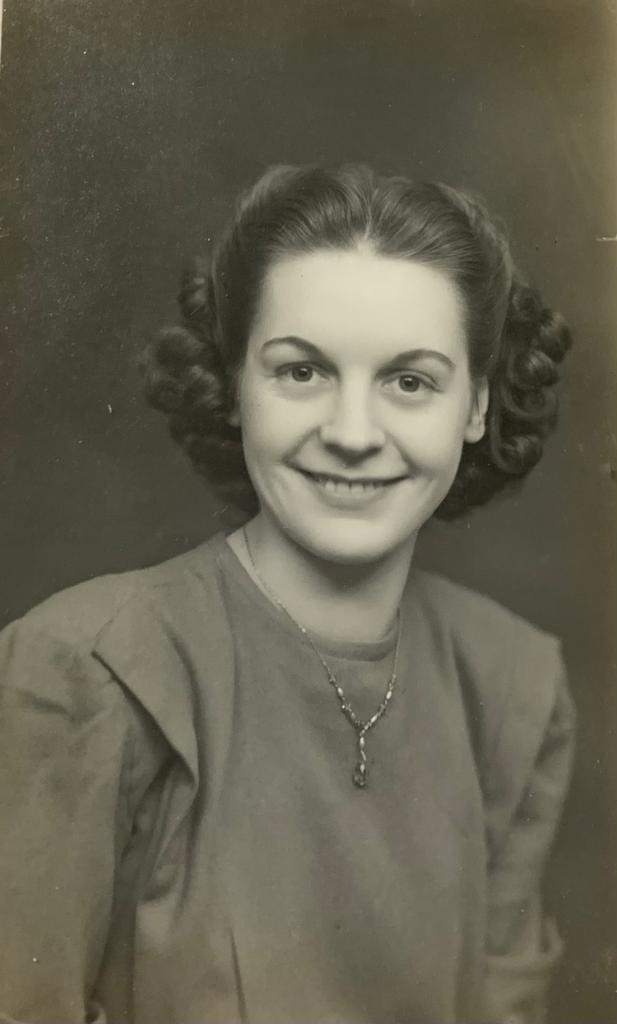For fifty years, I have earned my living as a writer. A wordsmith you might say.
I’ve written ads and commercials, books and book reviews, blogs and brochures, articles and essays, songs, scripts and speeches. It must amount to many hundreds of thousands of words. More likely millions.
But to express the love and admiration I feel for my mother, I have no words.
Many times, I tried to tell her. Many times, I failed. What came out of my mouth were the banalities and platitudes that we use to describe or reflect those strong incomprehensible emotions that overwhelm us at times like this.
But those commonplace words are true. They are real.
She was beautiful. She was caring. She was wise. She was forgiving. And she was giving of herself, surrendering a career in banking for the life of an RAF officer’s wife.
It was a role she played brilliantly, almost as well as she fulfilled her role as mother of five children.
Each of us have our own personal memories of times when she helped us, advised us, encouraged us, saved us from ourselves.
So too will many of Mum and Dad’s friends. So too will local charities. So too will her nine grandchildren and - at the last count - 18 great grandchildren.
In the story of her life which she left for us, this was her final line: “I wish to be remembered as a wife and mother” she wrote.
It is simple, succinct, poignant and profound. And it evokes an emotional maelstrom with which I have yet come to terms and cannot express in words.
What we all seek - and what today is for - is to arrive at the point when emotion is recollected in tranquillity.
That of course was Wordsworth’s definition of poetry. And it takes a poet to find the words we need, to provide for us that heightened language which helps us to understand and contextualise our grief, and thus to achieve a catharsis of sorts.
So here are a few short, succinct, poignant and profound stanzas from a poem, an ode, which resonated with me during her last illness and haunts me now.
The poet is William Empson. He wrote these lines in 1927, the year Mum was born.
It is entitled To An Old Lady.
Ripeness is all; her in her cooling planet
Revere; do not presume to think her wasted.
Project her no projectile, plan nor man it;
Gods cool in turn, by the sun long outlasted.
No, to your telescope; spy out the land;
Watch while her ritual is still to see,
Still stand her temples emptying in the sand
Whose waves o’erthrew their crumbled tracery;
Fears her precession do not throw from gear.
She reads a compass certain of her pole;
Confident, finds no confines on her sphere,
Whose failing crops are in her sole control.
Stars how much further from me fill my night.
Strange that she too should be inaccessible,
Who shares my sun. He curtains her from sight,
And but in darkness is she visible.
I’ve written ads and commercials, books and book reviews, blogs and brochures, articles and essays, songs, scripts and speeches. It must amount to many hundreds of thousands of words. More likely millions.
But to express the love and admiration I feel for my mother, I have no words.
Many times, I tried to tell her. Many times, I failed. What came out of my mouth were the banalities and platitudes that we use to describe or reflect those strong incomprehensible emotions that overwhelm us at times like this.
But those commonplace words are true. They are real.
She was beautiful. She was caring. She was wise. She was forgiving. And she was giving of herself, surrendering a career in banking for the life of an RAF officer’s wife.
It was a role she played brilliantly, almost as well as she fulfilled her role as mother of five children.
Each of us have our own personal memories of times when she helped us, advised us, encouraged us, saved us from ourselves.
So too will many of Mum and Dad’s friends. So too will local charities. So too will her nine grandchildren and - at the last count - 18 great grandchildren.
In the story of her life which she left for us, this was her final line: “I wish to be remembered as a wife and mother” she wrote.
It is simple, succinct, poignant and profound. And it evokes an emotional maelstrom with which I have yet come to terms and cannot express in words.
What we all seek - and what today is for - is to arrive at the point when emotion is recollected in tranquillity.
That of course was Wordsworth’s definition of poetry. And it takes a poet to find the words we need, to provide for us that heightened language which helps us to understand and contextualise our grief, and thus to achieve a catharsis of sorts.
So here are a few short, succinct, poignant and profound stanzas from a poem, an ode, which resonated with me during her last illness and haunts me now.
The poet is William Empson. He wrote these lines in 1927, the year Mum was born.
It is entitled To An Old Lady.
Ripeness is all; her in her cooling planet
Revere; do not presume to think her wasted.
Project her no projectile, plan nor man it;
Gods cool in turn, by the sun long outlasted.
No, to your telescope; spy out the land;
Watch while her ritual is still to see,
Still stand her temples emptying in the sand
Whose waves o’erthrew their crumbled tracery;
Fears her precession do not throw from gear.
She reads a compass certain of her pole;
Confident, finds no confines on her sphere,
Whose failing crops are in her sole control.
Stars how much further from me fill my night.
Strange that she too should be inaccessible,
Who shares my sun. He curtains her from sight,
And but in darkness is she visible.






 RSS Feed
RSS Feed